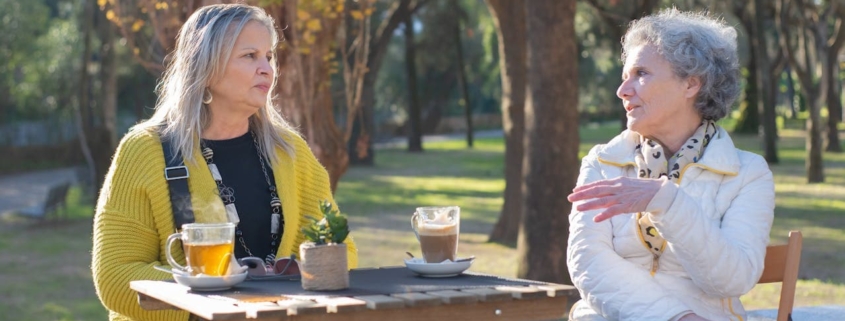Change is inevitable. It is a part of life and one of the few constants in our world. Change can also be frightening, especially if it arrives at a period of our lives that is already filled with numerous challenges. One of the most important and frightening changes for an older adult is the transition from autonomous to assisted living. And, if you have followed my train of thought so far, you will have guessed that I am about to discuss “the conversation”. The dreaded conversation about the possible transition of a loved one to an assisted living facility can be frustrating and distressing for everyone involved. And, as this decision affects the lives of all family members in different ways, the needs, fears, preferences and issues of everyone should be considered. Thus, the discussion will not necessarily end with a single decision but it will continue as all family members adjust to a new situation and their needs change and evolve.
Preparing for this discussion can be hard but it can be made easier if you start with an internal discussion. Ask yourself why you feel this transition is important for your loved one, what are the issues with their current living situation and if they can be solved in other ways, what are the benefits of an assisted living facility and, more importantly, how it will impact the quality of life of your loved ones and how it will affect the whole family. Only if you are certain about how you feel about this translation and its potential benefits will you be able to discuss it with your loved one and explain why you think it is necessary. Thus, you should not only research available options and types of assisted living facilities but, ideally, also visit some facilities to get acquainted with the living space and services they offer in order to assess if they are suitable for your loved one.
This conversation should happen at the right time and place. It is important to remember that the conversation should be honest and involve the whole family. Talk to your loved one and other family members about the need for this discussion. Ensure that everyone has time to prepare. Nobody should feel pressured to participate in a discussion that is abruptly introduced to them. These discussions can often feel like the rest of the family is trying to pressure loved one to accept an already made-up decision. This can feel patronizing and lead to anger, conflict and breach of trust. Ensure that you approach the conversation from place of genuine concern for your loved ones and be honest, empathic and willing to devote the time and effort to listen to them and discuss their needs, wants and fears. Include all members of the family and ensure that their needs are taken into account too. Don’t forget how hard it can be for children to adapt to a grandparent moving to assisted living and ensure that family time and activities continue after the transition.

A transition is not a moment in time but a process. Make a transition plan and don’t rush the process. Visit available facilities with your loved one and ensure that they can select one that is suitable for them. Address practical issues such as downsizing belongings and coordinating the move. Allow time for adjustment to the new environment and support your loved one as they are getting acclimatized to their new living situation. Even more importantly, ensure that family life and activities adjust to this new situation and your loved one can continue enjoying quality time with all family members and participate in family activities.
Change is constant. The conversation doesn’t end when our loved one has settled in an assisted living facility. As people grow older their needs may change and at the same time different family members may be going through changes in their own lives as well. The whole family must continue the conversation so that their loved one enjoys the best possible care and all family members enjoy quality time with them.
What can I do?
- As an older adult: Be open about your needs and your fears. Listen to your family and make sure you are being listened and helped to take the best decisions for your well-being.
- As a relative: Be empathic. Listen to your loved ones and work with them to ensure their quality of life. Involve the whole family in the discussion and ensure that family time and relationships are not hurt by the transition.
- As an assisted living or nursing home owner/ manager: Ensure that families can visit your facility and discuss available care options and amenities. Ensure continued communication between residents and their families and facilitate family time for your residents.



